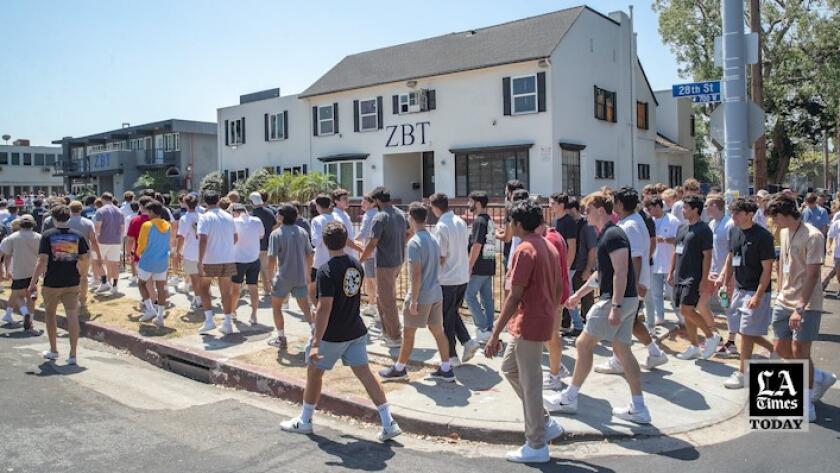USC breakaway fraternities make own rules, defy campus ban
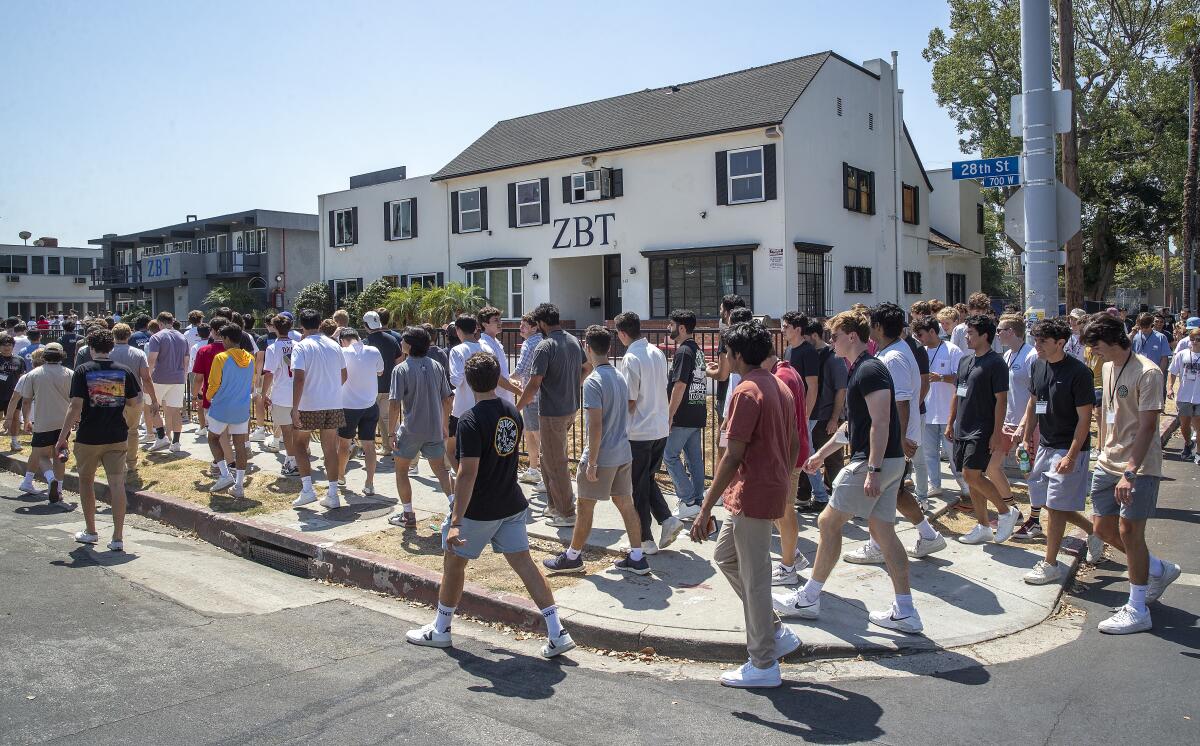
- Share via
On a warm Friday afternoon, a large crowd of young men walked along 28th Street near USC wearing sneakers, colored shorts and lanyards imprinted with their names as they visited one fraternity house after another.
They were welcomed by other young men dressed in colorful T-shirts branded with their fraternity name and graphic designs — one showed a hand wrapped around a glass bottle, another played off the “Kill Bill: Vol. 2” movie poster that featured a blond woman brandishing a sword. Another showed a retro image of a woman in formal attire being offered a bottle of soda — “Rush Kappa Alpha 2022,” the shirt said.
Rap and house music blasted from speakers. The guys shot hoops and lobbed a volleyball in a sand pit. And on the sidewalk, prospective and current fraternity members traded notes. “This one had the free burritos,” one said to two young men next to him.
In many ways, such fall “rush” or recruitment activities are a Greek life rite of passage. But they are limited at USC. In 2017, the university banned fall rush for first-year students after multiple reports of hazing at fraternity houses and longstanding faculty concerns about the negative effect of pledging rituals on student grades and health.
However, the eight fraternities that welcomed first-year students to their recruitment event Friday had all disaffiliated from USC last week. In a bold move and despite USC warnings, they decided that, for better or worse, they would rather be free from what they said are unfair university policies and chart their own course.
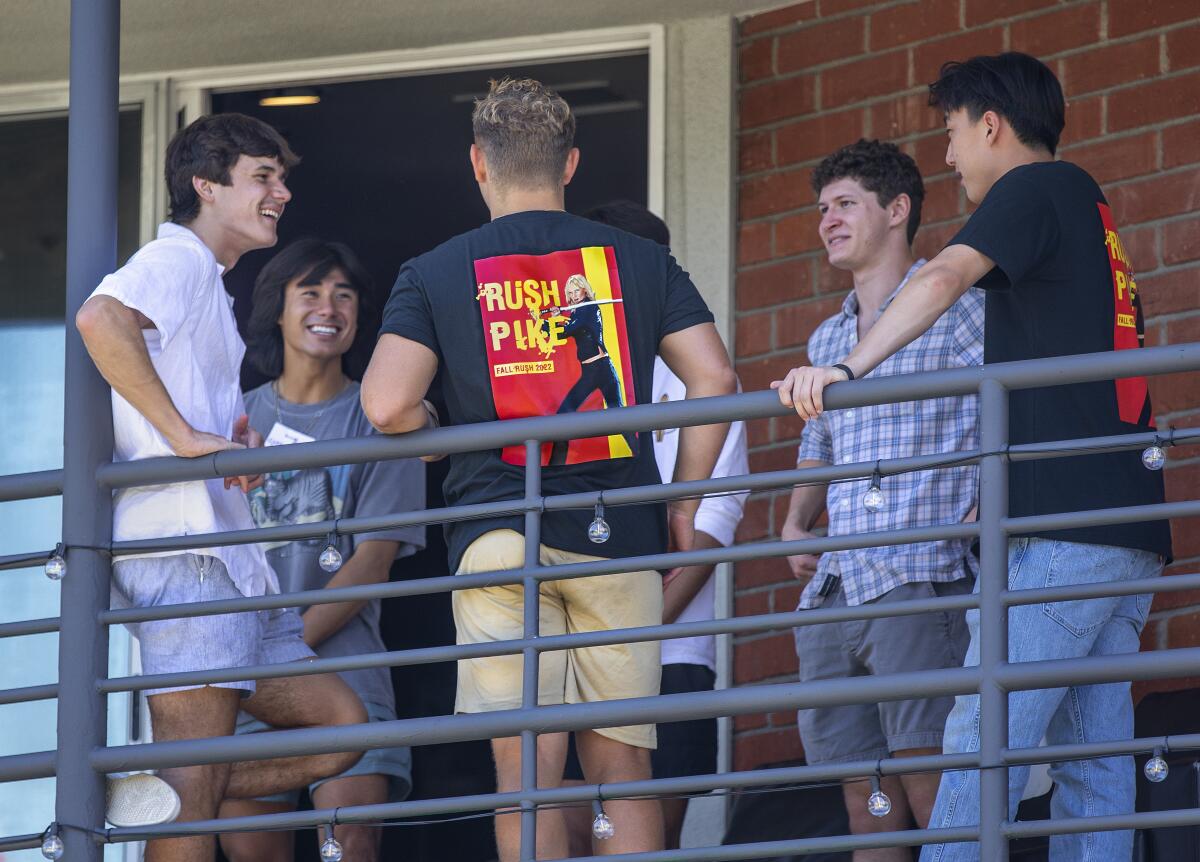
As USC students, they remain subject to campus conduct rules and laws against hazing, sexual assault and other misconduct.
USC strongly criticized the move to disaffiliate and invite first-year students to rush, saying in a statement that such fall recruitment “has been repeatedly shown to be unsafe for new students.” The university, which stripped the breakaway fraternities of the right to use the USC name, logo or campus Greek life resources, also asserted they were “chafing at procedures and protocols designed to prevent sexual assault and drug abuse and deal with issues of mental health and underage drinking.”
The university has posted a prominent warning against the breakaway fraternities on the campus Greek life portal:
“The following groups are NOT AFFILIATED with USC. They are not subject to oversight by university staff, and have elected to forgo support resources and other benefits provided to recognized student groups. Some groups are undertaking unauthorized recruitment. Students are STRONGLY RECOMMENDED to not join or affiliate with these organizations.”
But Harrison Murphy of the newly formed University Park Interfraternity Council, an umbrella organization for the breakaway chapters, said Friday the claim that they were rebelling against strict party rules is untrue.
“I want to say unequivocally that no, we are not disaffiliating to dodge these social event policies that were put into place,” said Murphy, a senior majoring in political science and history.
In fact, he said, the 15 chapters that were members of the USC Interfraternity Council last year first recommended most of the strict rules issued by a university working group after multiple allegations of drugging and sexual assault at Sigma Nu and other fraternity house parties in fall 2021.
Fraternity leaders came up with the rules to post security guards at hallways leading to bedrooms, create “sober rooms” to provide drunk partygoers with water and food, provide toxicity testing kits for those who suspect they had been drugged, and require alcohol to be served in closed containers. Some chapters even hired emergency medical technicians for parties, he said, and all social events are staffed by third-party security guards and licensed professional bartenders.
The University Park Interfraternity Council is abiding by all of these rules and will not admit any fraternity facing misconduct allegations, he said. The breakaway fraternities in the new council are: Beta Theta Pi, Kappa Alpha Order, Lambda Chi Alpha, Pi Kappa Alpha, Sigma Alpha Mu, Sigma Chi, Tau Kappa Epsilon and Zeta Beta Tau.
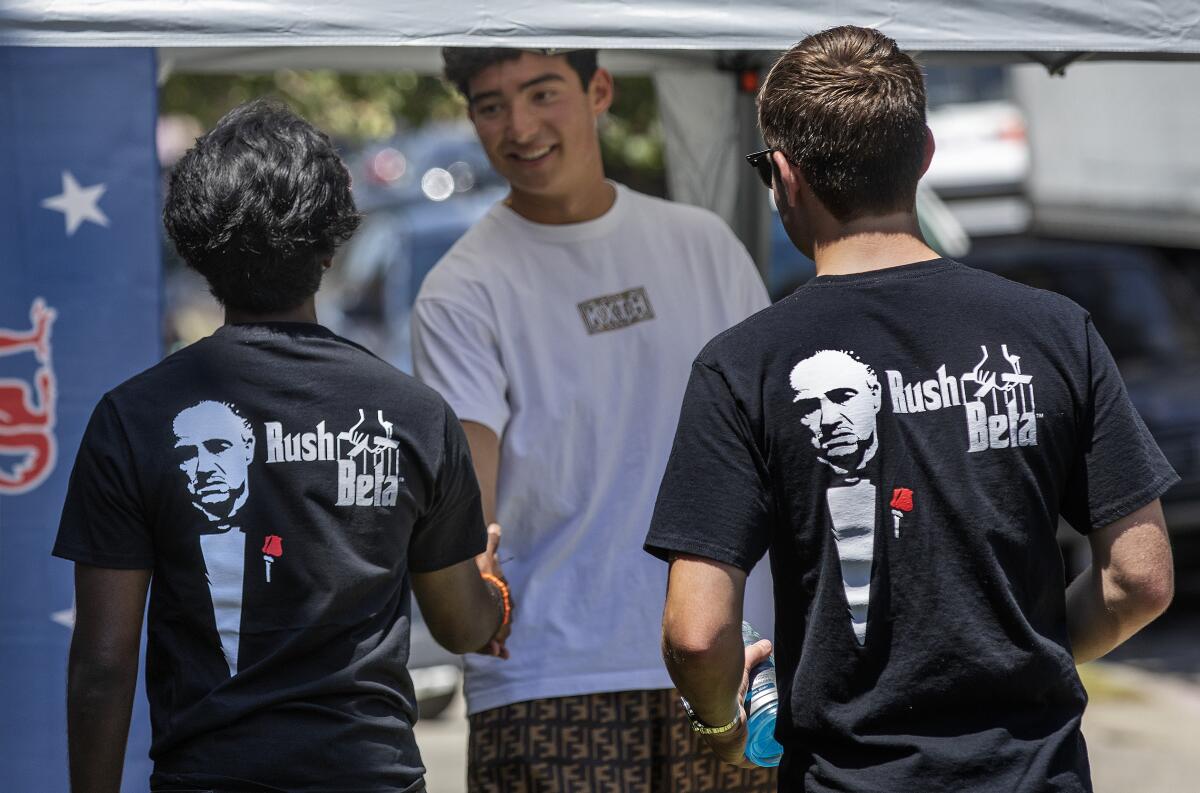
Murphy said members that separated from USC did so because they felt the university’s policies toward Greek organizations were unfair and flawed. For instance, he said, USC banned all social events from November 2021 through January 2022 even for fraternities that had done no wrong. Most were not able to resume events until March due to lengthy new safety training requirements, he said.
Despite months of negotiations between USC and the fraternities, the two sides could not reach agreement on the scope of sanctions or a faster timeline to resolve their conflicts.
“We reached a final point where the [breakaway] groups did not want to go through another year of this type of system,” said Judson Horras, president of the North American Interfraternity Conference, which represents more than 6,200 member chapters in 57 national and international men’s fraternities.
Horras, whose national organization is supporting the USC breakaway groups, said the university’s group sanctions were backfiring. “They are creating a silencing effect for members of the community to hold individuals accountable and report the behavior to the school for fear that other members who did nothing wrong ... will be penalized.”
USC declined to respond to questions about the fairness of its process or potential effect on reporting wrongdoing.
The issue of fall rush has long been a flashpoint at USC. In 2015, the Academic Senate passed a resolution calling for deferred recruitment of first-year students until the spring, noting that more students missed class or attended class exhausted or intoxicated during their pledging commitments. The USC undergraduate student body passed its own resolution opposing deferred recruitment.
USC officials banned fall rush for freshmen in 2017, citing a study two years earlier that indicated two-thirds of on-campus sexual assaults at USC took place at a fraternity or sorority house and that 20 peer institutions had some form of deferred recruitment.
Several fraternities and one sorority sued USC in 2018, arguing that the deferred recruitment policy violated their state protections of free association and imposed discriminatory restrictions on them that were not required for other student organizations. Both the trial court and appellate court upheld USC’s claims that the actions were based in legitimate academic concerns.
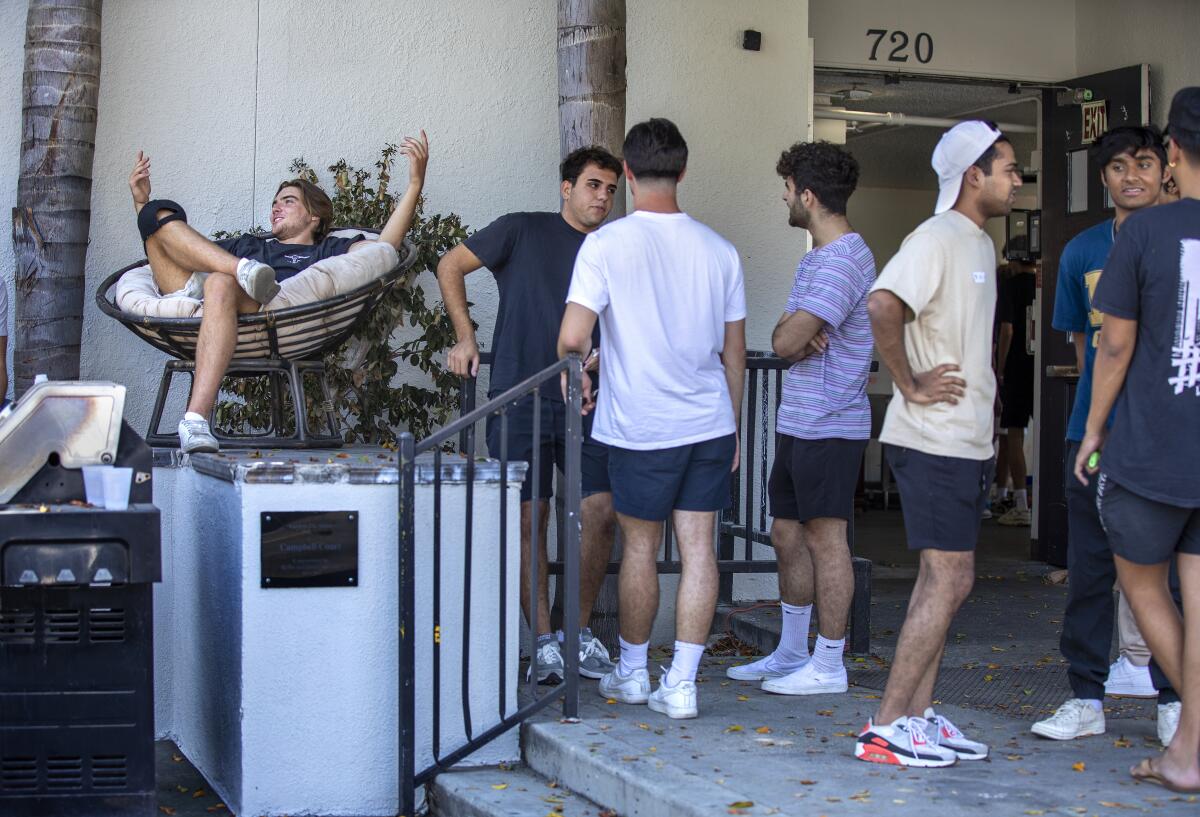
Some experts backed USC’s argument that fall rush for first-year students could be unsafe. John Hechinger, author of “True Gentlemen: The Broken Pledge of America’s Fraternities,” a 2017 book on fraternity culture focusing on Sigma Alpha Epsilon, said research indicated that hazing incidents declined when rush is deferred for a school term. He added that many fraternities lobby against such bans because they drive down membership — and lucrative dues.
But Horras said more than 90% of fraternities across the nation are permitted by their campuses to conduct fall rush for freshmen. That includes UCLA, UC San Diego, UC Irvine and most of the other UC and California State University campuses.
At UC Irvine, fall rush for new students helps them find a “home away from home” and provides them an immediate support system to adjust to campus and an alumni network for career and leadership opportunities, said campus spokesman Tom Vasich.
“The brotherhood and sisterhood from fraternities and sororities really help new students to adjust if they are a first-gen, a transfer student, a commuter student or just someone trying to figure out university life,” Vasich said.
The University of the Pacific in Stockton banned fall rush for first-year students for years but reinstituted it last fall to help students quickly find community after two years of pandemic isolation, said Maria Blandizzi, vice president for student life. She said there has been no increase in student conduct problems or decline in academic performance.
At USC, it remains unclear how the showdown between the university and the disaffiliated Greek chapters will play out — especially with sorority members who are prized attendees at fraternity parties.
Sorority leaders were evaluating the decision by fraternities to disaffiliate, said Valeria Hernandez Echegaray, vice president of public relations for the USC Panhellenic Council, which represents nearly a dozen campus sorority chapters. Earlier this week, she said the council planned to seek more information and discuss a response.
For the record:
11:47 a.m. Aug. 21, 2022An earlier version of this article incorrectly stated the National Panhellenic Council is an umbrella group representing more than two dozen sororities in the U.S. and Canada. The group is called the National Panhellenic Conference.
The National Panhellenic Conference,an umbrella organization for more than two dozen sororities in the United States and Canada, allows sororities to interact with disaffiliated fraternities as long as the fraternities left the university while still in good standing.
“Without more information, we can’t speak to the details of the situation at USC,” said Dani Weatherford, chief executive of the National Panhellenic Conference. “However, we have long understood that organizations choose to disaffiliate from universities for a variety of legitimate reasons, because in some cases Panhellenic organizations have done so as well.”
- Share via
Watch L.A. Times Today at 7 p.m. on Spectrum News 1 on Channel 1 or live stream on the Spectrum News App. Palos Verdes Peninsula and Orange County viewers can watch on Cox Systems on channel 99.
More to Read
Sign up for Essential California
The most important California stories and recommendations in your inbox every morning.
You may occasionally receive promotional content from the Los Angeles Times.
